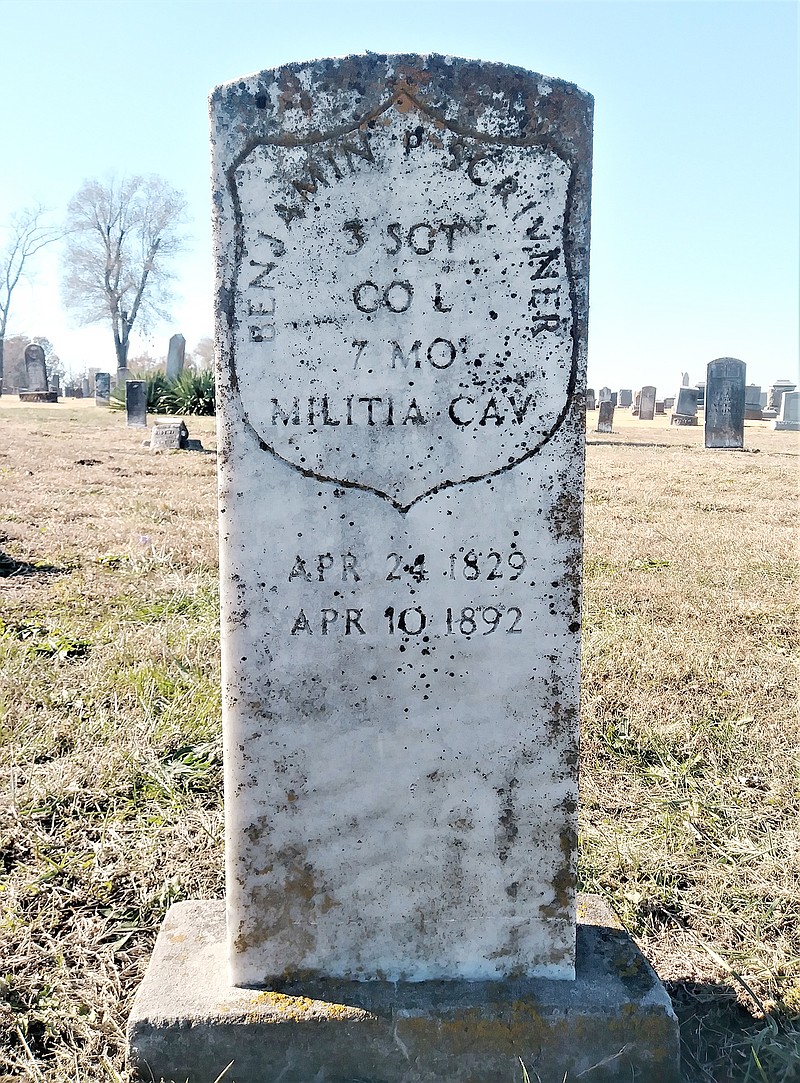A modest granite headstone denoting the Civil War service of Benjamin Payne Scrivner starkly rises among a few shorter markers in the older section of Enloe Cemetery west of Russellville. Born in Cole County on April 24, 1829, James E. Ford noted in his book "A History of Jefferson City," that Scrivner's parents were one of the original families to settle in Jefferson City and lived in the community when the state Capitol was built there in 1826.
"According to some of our family records and a family history book that my sister put together, his family moved to this area (in Moniteau County near Enloe Cemetery) in 1832," said Miriam Bond, great-, great-granddaughter of Scrivner. "Other than that, we really don't know much about him or his military service."
Although a young Scrivner came of age near Russellville, the community was not established as a town until 1838, six years after the family moved to the area. Family records indicate the 21-year-old Scrivner married Catherine Jane Jones on April 12, 1850, days before she turned 17 years old.
The 1850 U.S. Census reveals that in addition to his marriage, Scrivner busied himself in the years leading up to the Civil War when he embarked upon the same career path of his father by becoming a farmer.
As the years passed, Bond noted, "He and his wife had three children before she passed away on Sept. 16, 1858." Information retrieved from the Find A Grave website notes that his 25-year-old wife was laid to rest on the Old Scott Farm near Brazito, which was owned by the family of his wife's mother.
The next several years would find the young farmer toiling to scratch a living from his land with the help of his young children he now had to raise on his own. However, shortly after the Civil War erupted in 1861, he made the decision to leave his children with family and become a soldier in the Union Army.
Muster rolls accessed through the Missouri State Archives indicate a 32-year-old Scrivner enrolled as a corporal with Company H, 3rd Cavalry Volunteers of the Missouri State Militia at Chillicothe on April 5, 1862. The company was later re-designated Company L, 7th Regiment Missouri State Militia Cavalry under the command of Tennessee native Maj. Murline C. Henslee.
In 1908, Frederick H. Dyer explained in his book "A Compendium of the War of Rebellion, Volume III," that the regiment was "(o)rganized at large in Missouri (in) March and April, 1862."
Dyer noted the regiment spent a few months under authority of the Union Army component designated the Department of Missouri but soon transferred to the District of Southwest Missouri. Then, in October 1962, they were "unattached" to the Army of the Frontier and, the next year, received their final transfer to the District of Central Missouri, with whom they spent the largest period of their wartime service.
Though sprinkled with skirmishes and battles throughout Missouri and parts of northern Arkansas, Scrivner's military experience found its greatest intensity in the fall of 1864. During this period, the soldier had achieved the rank of sergeant and returned to the Mid-Missouri area when his regiment was pitted against a famed Confederate general - Sterling Price.
Mark A. Lause, in his book "The Collapse of Price's Raid: The Beginning of the End in Civil War Missouri," explained, "As of Saturday, October 8, 1864, General Sterling Price's Army of Missouri found itself transformed from a liberating force into an oversized raiding column."
The author further noted Price had spent "nearly three weeks marching through much of the Federal Department of Missouri, which had generally kept its best-trained and -equipped forces away from the Confederates."
As the Confederates moved through Mid-Missouri, pressing westward, Sergeant Scrivner and his regiment joined Union forces in battles against Price's forces. This included engagements such as the Fourth Battle of Booneville, Second Battle of Independence and the Battle of Westport, the latter of which drove Price's forces into retreat.
The 7th Regiment Missouri State Militia Cavalry remained in service within the state throughout the next several months. On April 4, 1865, Scrivner was mustered out of the service only five days prior to Gen. Robert E. Lee surrendering his Confederate forces to Gen. Ulysses S. Grant at Appomattox Courthouse in Virginia.
Returning to his farm near Russellville, Scrivner reunited with his children and again immersed himself in the daily rigors of working the land. Months later, on Oct. 10, 1865, he married Nancy Holder and the couple raised 11 children together (in addition to the three he had with his previous wife). The 62-year-old veteran died on April 10, 1892, and was buried in Enloe Cemetery near Russellville.
Joshua Lawrence Chamberlain, a college professor from Maine who achieved the rank of brigadier general in the Union army during the Civil War, sagely said of soldiers such as Scrivner who volunteered to serve, "The power of noble deeds is to be preserved and passed on to the future."
Placing her finger on a hazy photograph of her great-, great-grandfather that was printed inside one of the worn pages of a family history book, Miriam Bond noted, "He died several decades before I was even born and there is really nothing left to remember him by other than his stone in Enloe Cemetery."
She added, "It is nice to know a little bit about him and the sacrifices he made during his military service so that I can share it with my two sons and daughter and make sure he is remembered by our family."
Jeremy P. Amick writes on behalf of the Silver Star Families of America.

